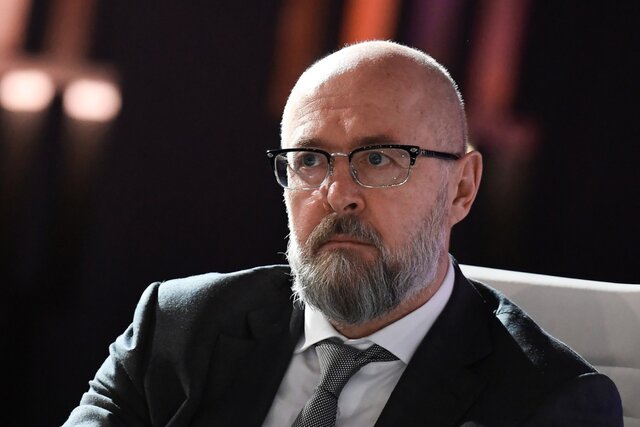Homo Putinus. In April, Kremlin ideologist Alexander Kharichev wrote a ‘blueprint for Putinism.’ In his new essay, he envisions Russia’s ‘person of the future.’
Manage episode 517994417 series 3381925

Kremlin official Alexander Kharichev has published a new essay. As the head of the Putin administration’s team for “monitoring social trends,” Kharichev plays a central role in shaping the regime’s ideological doctrine. In his latest manifesto, he outlines his vision for how Russia should cultivate the “person of the future,” emphasizing philosophy classes, large families, and self-sacrifice. He also identifies what he calls the country’s “main threats,” including civil war and demographic decline. Meduza special correspondent Andrey Pertsev unpacks Kharichev’s main arguments.
In his last essay, “Civilization Russia,” Kremlin official Alexander Kharichev asserted that Russians value collectivism over individualism and are prepared to sacrifice themselves for the good of the state.
His latest publication, “Who Are We?,” appears in the November issue of The State, a policy journal published by the Russian Presidential Academy of National Economy and Public Administration (RANEPA). The magazine’s editor-in-chief, political strategist Andrey Polosin, is considered a close ally of Sergey Kiriyenko, the deputy chief of staff overseeing the Kremlin’s domestic policy team. Polosin also created the propagandistic college course “Foundations of Russian Statehood,” which became mandatory for all first-year students in 2023.
Our only hope is you. Support Meduza before it’s too late.
In his new article, Kharichev proposes supplementing Polosin’s course with a module on “Russian philosophy.” He also calls for expanding the Russian history curriculum, which has been compulsory for all university students since 2023, regardless of their field of study. Currently, the general philosophy course, which focuses on philosophical traditions from around the world, is required only for humanities students. Kharichev explains his reasoning as follows:
After years of dogmatic teaching of Marxism-Leninism, there remains a certain prejudice against philosophy in Russia. This can fundamentally be changed by creating a textbook on Russian philosophy. The textbook should answer the main question: what is a human being, and what is the true meaning of existence?
Kharichev argues that Russian higher education needs a stronger “social and humanitarian core.” Alongside “Russian philosophy,” he advocates mandatory courses in Russian law, cultural studies, and economics. These subjects, he insists, should also be taught to engineering students, who currently receive little exposure to the humanities. “You can’t become a manager in production — which is the engineer’s mission — without understanding how the world works,” he writes.
The official also refers to upcoming “patriotic education laws,” which he says will soon be announced. Russian media have reported that the Kremlin began drafting such legislation last fall, intending to submit it to the State Duma in early 2025, though this has yet to occur. According to Kharichev, the law will include specific KPIs for officials responsible for patriotic education, though he offers no details on what those metrics will be.
Kharichev’s last essay
Kharichev then turns to demographics, urging an aggressive campaign to promote large families. He argues that films and advertisements “should not feature families with [only] one or two children.” This is despite the fact that, according to his official biography on the website of VTsIOM (the Russian Public Opinion Research Center), Kharichev himself has two children.
Many of the themes in Kharichev’s new essay echo his earlier writings. Like in his previous piece, for example, he warns of the threat of “civil war.” However, he appears not to be referring to any immediate risk in modern Russia, but rather to potential internal divisions that could arise within any society.
The warning comes among a broader list of dangers supposedly facing Russia, including “the fragmentation of society,” “the division of the country,” and “the loss of the country’s ability to fight for its own preservation and development.” Kharichev writes:
We’ve gone through this at least twice in our history — in the 17th and 20th centuries. And who’s to say it can’t happen again? The causes can be anything, from ethnic or religious tensions to generational or property conflicts. But this risk — or rather, this challenge and threat — is always present in any social system.
In “Civilization Russia,” published in April, Kharichev issued a similar warning about “the loss of internal unity” and the “splitting of society.”
Historical examples — from the Time of Troubles to the revolutions of the 20th century — clearly show that when society becomes divided, statehood comes under threat. The contradictions may vary — social, political, moral, or spiritual — but the result is always the same: a divided country becomes easy prey for external forces.
Both essays also focus on other perceived challenges, including “threats to sovereignty” and demographic decline.
In “Who Are We?” Kharichev also reiterates another key point from “Civilization Russia”: the supposedly “self-sacrificing nature” of the Russian people. “For us, life itself seems to mean much less than it does for a Westerner. We believe there are things more important than mere existence. That, in essence, is the foundation of any faith,” he asserts.
In both essays, Kharichev maintains that Russians value faith over rationalism, and trust and justice over formal law.
In the conclusion of “Who Are We,” he declares that the Kremlin’s chief mission is to cultivate “the person of the future” — an individual dedicated to “preserving and developing our civilizational system.” In Kharichev’s vision, this person will “serve the state,” have “three or more children,” and place the interests of the collective above their own.
66 episodes



